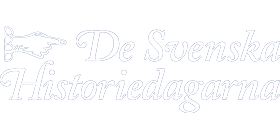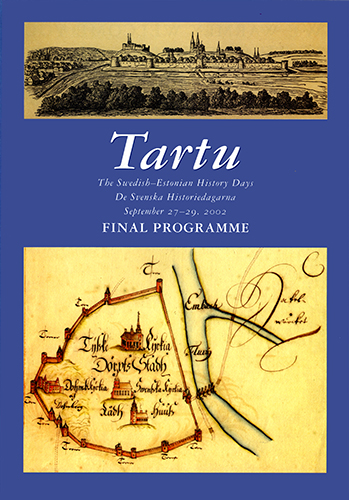DE SVENSKA HISTORIEDAGARNA I TARTU 2002
THE SWEDISH–ESTONIAN HISTORY DAYS
De Svenska Historiedagarnas konferens i Tartu den 27–29 september 2002
Ladda ned programmet i PDF-format
Invigning samt alla seminarier ägde rum på Universitetet i Tartu, Ülikooli 18
As part of its ramble around Sweden, and later on around the Baltic region, the History Days programme now reached Estonia and the ancient centre of learning, Tartu. The Swedish-Finnish cooperation during the run-up to the history days in Turku and the corresponding Swedish-Norwegian ones in Karlstad and Gothenburg had shown not only the value of a wider ranging illumination of traditional historical issues, but also the role of an interest in history in building a bridge between neighbouring countries. The choice of Tartu was not difficult to comprehend.
We have a 150-year period of shared history with Estonia, and links have been close since prehistoric times. Tartu was founded in 1030 and during the 13th century, as Dorpat, it became an episcopal see under the authority of the Teutonic Order. As a Hanseatic town, there were close links with Russia, and during the Swedish era, Dorpat developed into a centre of learning with the setting up of Sweden’s third Court of Appeal there in 1630 and, above all, the establishment in 1632 by Gustavus II Adolphus of the university – Sweden’s second.
Estonia has a dramatic history. Tartu has been laid waste by war, and in 1775, by an extensive fire. Remnants of former days include, in particular, the old cathedral church, now reverently restored as a university museum. In the 19th century, the university gained a position of eminence amongst the seats of learning in the Russian Empire and to this day, the main building, with its Empire style façade, makes a classical contribution to the cityscape. This was where we would spend our time during the history days. In front of the building stands a statue of Gustavus II Adolphus, re-erected in 1992, whilst around the Cathedral Mount lie the university buildings in a secluded and fascinating milieu that brings to mind the centuries when the city was the heart of a cultural union between east and west.
The Swedish History Days aroused considerable interest in Estonia, and the event turned out to be a memorable one in many ways.
| Friday, September 27 | ||
|
Lunch will be served at the University Cafeteria |
|
Welcome |
||
Welcoming words in the Aula by Dr Erik Norberg, Chairman of the History Days Welcoming Address by Prof Dr Jaak Aaviksoo, Rector of Tartu University |
||
Coffee break |
||
Parallel seminars |
||
Pagan cult and Christianity: the Baltic people and their early concept of Europe Moderator: Agneta Lundström |
||
The age of Axel Oxenstierna: European statesman and magnate in the Baltic area Moderator: Erik Norberg |
||
The impact of the Baltic provinces on culture and philosophy in the Swedish Realm Moderator: Anders Björnsson |
||
The Beijer scholarships I, presentation of young historians from Sweden and Estonia. The session will be held in Swedish and English. |
||
Reception in the Vanemuine Theatre hosted by the City of Tartu |
||
| Saturday, September 28 | ||
|
Plenary lecture in the Aula |
|
The Big Flight from Estonia to Sweden 1944 |
||
Coffee break |
||
Parallel seminars |
||
Old structures vs innovations: administration, education and church in the 16th to 18th Centuries Moderator: Prof Dr Torkel Jansson |
||
Societies in transition: consequences in education, curriculae and textbooks in history teaching and learning Moderator: Hélène Edgren |
||
Music and poetry in 19th century politics. Building nations and national identities Moderator: Stefan Bohman |
||
Agriculture in Estonia and the Swedish Realm Moderator: Lars Magnusson |
||
Lunch will be served at the University Cafeteria |
||
Topical subject in the Aula |
||
"Focal point seminar" Estonia, Russia, EU and NATO |
||
Coffee break |
||
Parallel seminars |
||
White nights and black: two authors continuing the conversation they started in "Are the nightingales still singing in Dorpat?" with (G F Parrot) reflections on current politics, life-style and their countries. The session will be held in Swedish |
||
The cold war relations Moderator: Professor Bo Huldt |
||
Media and historical transformations around the Baltic Sea Moderator: Mr Ernst Klein, Chairman of Svensk presshistorisk förening |
||
The Beijer scholarships II, presentation of young historians from Sweden and Estonia The session will be held in Swedish and English. |
||
Closing dinner with entertainment at Püssirohukelder, The Gunpowder Cellar. |
||
| Sunday, September 29 | ||
|
Excursion to Narva |
|
We get together in the hotel lobby at 08h00 for departure. |
||
Excursion to Pärnu |
||
We get together in the hotel lobby at 08h30 for departure. |
||
Sightseeing Tallinn |
||
We get together in the hotel lobby at 08h30 for departure. |
||

